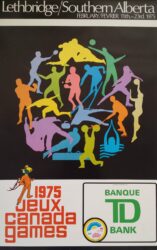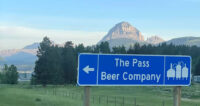Where were you in 1975?
By Woodard, Dale on August 6, 2020.
 Submitted photo - Researchers from Brock University are looking to gather stories from the Lethbridge-hosted 1975 Canada Winter Games.
Submitted photo - Researchers from Brock University are looking to gather stories from the Lethbridge-hosted 1975 Canada Winter Games.Dale Woodard
Lethbridge Herald
Do you have some great memories of the Lethbridge-hosted 1975 Canada Winter Games?
If so, a university in Ontario wants to hear your story.
As the Niagara region gets ready to host the 2021 Canada Summer Games next August, a group of researchers from Brock University in St. Catharines, Ont., are encouraging people from across Canada to share their Games experiences – positive or negative – from years and decades past as part of a new crowd-sourced digital history project that will become available via a live website starting in October.
The project came about as Elizabeth Vlossak, associate professor in the department of history at Brock University, was preparing for her new course, “Making History in Niagara,” which will see students create an online museum exhibition about the Games to launch in time for the 2021 Canada Summer Games. Vlossak discovered there weren’t many sources for students to work with and decided to create the new collection.
“When I was getting this ready and doing some research and finding resources for my students to use, I discovered that even though the Canada Games Council has archives in Ottawa and there are collections of digitized images – and I know the Galt Museum has a nice collection from 1975 – there were a lot of stories that seemed to be missing,” said Vlossak. “Having talked to the Canada Games Council about this, they suggested I reach out to some past Canada Games council members, officials and coaches. They put me in touch with some people and we’ve been conducting these oral history interviews. But I also realized that, again, there were a lot of stories missing and how do we actually capture some of the more personal and private stories of how people experienced them, not as officials or people who have gone on to have really successful careers in sports, but people who had an amazing experience because they were a volunteer or someone who attended a lot of the events and has memories they want to share.”
The project started in late-January, but when the COVID-19 pandemic hit in mid-March, Vlossak decided to move the project to an online platform.
Going the crowd sourcing and image-sharing route allowed Vlossak and her researchers to find the stories they were looking for.
“We’re actually collecting artifacts in a digital format, which is really exciting,” said Vlossak. “So we’re building this collection of interviews of video and audio recordings, but also images and artifacts. Some of them may have not been considered valuable to anybody else, but somebody kept it because it had significance to them. So we’re asking people to explain to us why this particular photograph or item they saved is important to them and how does that item speak to them or bring back a particular memory. So you associate that memory to this object.”
Those contributing don’t necessarily have to upload an image.
“You can just write a one-paragraph memory of the Games,” said Vlossak. “You don’t have to have an item, you can just contribute your memory.”
Those submitting a story are urged to read the terms of service in regards to privacy issues and permission for researchers to use the material for their work, said Vlossak.
“If you’re under 18 you need to have a parent or legal guardian upload the material for you. But we want younger contributors as well. We don’t want it to only be older people contributing. We’re casting our net as widely as possible.”
Vlossak added memories of the Games don’t necessarily have to be fond ones.
“(Maybe) they actually had a terrible time,” she said. “They experienced racism or sexism or the infrastructure and the promises of what they were going to get really didn’t deliver, that the Games weren’t really what they were expecting. We want to highlight, showcase and celebrate the Games, but also allow for people to maybe express some other stories or feelings that haven’t necessarily been captured anywhere else.”
The project officially launched last Monday and Vlossak said the interest has been high.
“I don’t know if it’s COVID or people are starved for sports or if it’s just a feel-good story, it’s bringing back lots of positive, really happy memories for people. They’re really excited about this and the response has been great,” she said. “We’re ramping up for the excitement of hosting it. To hear about how other people experienced it in their own communities is also us getting excited about it happening here, too.”
Those wishing to contribute an artifact or a story can visit https://exhibits.library.brocku.ca/s/canada-games-collection/page/welcome.
“There is a welcome page that explains the project and examples of the kinds of items that we’re looking for but, of course, you can put whatever you want in it,” said Vlossak.
The home page will bring up a “next” button where people click to contribute and fill in personal details.
“You can submit anonymously, you don’t have to have your name associated,” said Vlossak, adding the researchers reserve to right not to post contributions. “But we would like to have as much information as possible. If you can tell us when the item is from, the year, as much detail as you have about it and then a description. Then we’ve included a box where you can write whatever you want to write about your experience, how it’s related to this item and why you’ve chosen this item.”
Submissions to the site will be available for viewing in October, but Vlossak said they’ll be taking submissions after that date.
“But that’s when the live version for people to see what other people have posted is going to be made available,” she said. “That’s going to be exciting when we’re able to announce people can come and visit (and see) what people have donated because it might prompt more people to think ‘That’s cool. I didn’t think what I had was of any value.’ But once they see what other people have donated they’ll think their stuff will belong in this collection. So we’re really curious to see what it is that people have kept and what they believe is valuable to them and is representative of their experience of the Games.”
Follow @DWoodardHerald on Twitter
27-26




